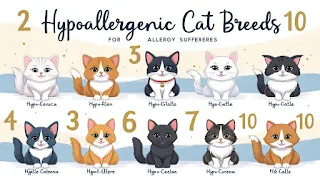Hypoallergenic Cat Breeds: A Guide for Allergy Sufferers
For those who adore cats but suffer from allergies, finding the right feline companion can be challenging. Fortunately, there are hypoallergenic cat breeds that produce fewer allergens, making it possible for allergy sufferers to enjoy the company of a furry friend. In this guide, we will explore the top 10 hypoallergenic cat breeds, their characteristics, grooming needs, and suitability for your home.
Best Cats for Allergies: Choosing the Right Companion
When selecting a cat breed that is best for allergies, it is important to consider not only their hypoallergenic qualities but also their temperament, grooming requirements, and how well they fit into your lifestyle. Here are some of the best cats for allergies:
Cats That Are Hypoallergenic: Understanding the Basics
Hypoallergenic cats are breeds that produce fewer allergens compared to other cats. Allergens are typically found in cat saliva, skin, and urine. While no cat is completely allergen-free, hypoallergenic breeds are less likely to trigger allergic reactions. Let's take a look at some of these breeds:
Best Hypoallergenic Cats: Top Breeds to Consider
1. **Siberian**: Despite their long fur, Siberians are known for producing lower levels of the Fel d 1 protein, which is responsible for triggering allergies.
2. **Balinese**: Often referred to as the "long-haired Siamese," Balinese cats have a silky coat and produce fewer allergens.
3. **Oriental Shorthair**: With their short, fine coat, Oriental Shorthairs are less likely to spread allergens around your home.
4. **Devon Rex**: Known for their unique, wavy coat, Devon Rex cats have less fur and produce fewer allergens.
5. **Cornish Rex**: Similar to the Devon Rex, Cornish Rex cats have a short, curly coat and are a great option for allergy sufferers.
6. **Sphynx**: The hairless Sphynx is an excellent choice for those with allergies, as they have no fur to trap allergens.
7. **Russian Blue**: This breed has a dense double coat that traps allergens, reducing their spread in the environment.
8. **Bengal**: Bengals have a short, pelt-like coat that produces fewer allergens and requires minimal grooming.
9. **Javanese**: With their single-layer coat, Javanese cats produce fewer allergens and are easier to groom.
10. **Burmese**: Burmese cats have a short coat and produce fewer allergens, making them a good choice for allergy sufferers.
Most Hypoallergenic Cats: Characteristics and Grooming Needs
Hypoallergenic cats often have specific characteristics that make them suitable for allergy sufferers. These include producing fewer allergens, having a particular coat type, or requiring regular grooming to minimize allergen spread. It is essential to understand the grooming needs of these breeds to ensure they remain a good fit for your home:
1. **Siberian**: Regular brushing is necessary to maintain their long coat and reduce allergen build-up.
2. **Balinese**: Their silky coat requires minimal grooming, making them low-maintenance.
3. **Oriental Shorthair**: Weekly brushing helps to keep their short coat in good condition.
4. **Devon Rex**: Occasional baths and regular ear cleaning are needed due to their unique coat and ear structure.
5. **Cornish Rex**: Similar to the Devon Rex, they require occasional baths and ear cleaning.
6. **Sphynx**: Regular baths are essential to remove the natural oils that accumulate on their skin.
7. **Russian Blue**: Weekly brushing helps to manage their dense coat and reduce allergens.
8. **Bengal**: Minimal grooming is needed due to their short, pelt-like coat.
9. **Javanese**: Their single-layer coat requires regular brushing to prevent matting.
10. **Burmese**: Weekly brushing is sufficient to maintain their short coat.
Cats Good for Allergies: Finding the Perfect Match
When looking for a cat that is good for allergies, it is important to consider your living situation, lifestyle, and personal preferences. Some hypoallergenic cats are more active and playful, while others are more laid-back and affectionate. Take the time to research each breed and interact with them to find the perfect match for your home.
Allergy-Free Cat Breeds: Myth or Reality?
It is important to note that no cat breed is entirely allergy-free. Hypoallergenic cat breeds produce fewer allergens, but they may still cause reactions in highly sensitive individuals. It is always a good idea to spend time with a cat before bringing them home to ensure that you do not experience severe allergic reactions.
Least Allergenic Cats: Making an Informed Decision
Choosing a hypoallergenic cat breed involves understanding their characteristics, grooming needs, and how well they fit into your lifestyle. By making an informed decision, you can enjoy the companionship of a feline friend without the discomfort of allergies. Remember to consult with breeders, veterinarians, and other cat owners to gather as much information as possible before making your choice.




